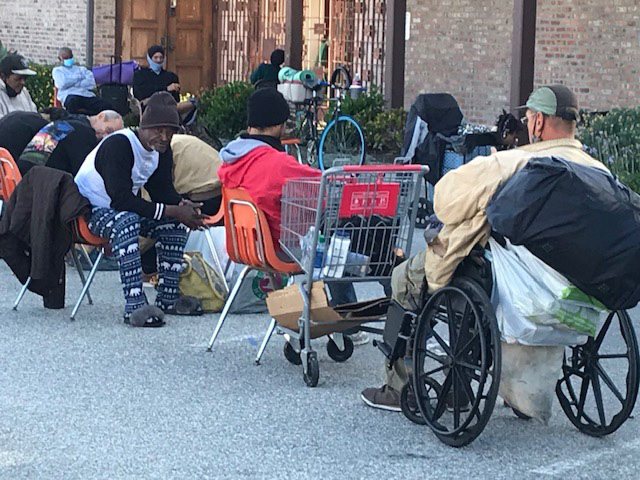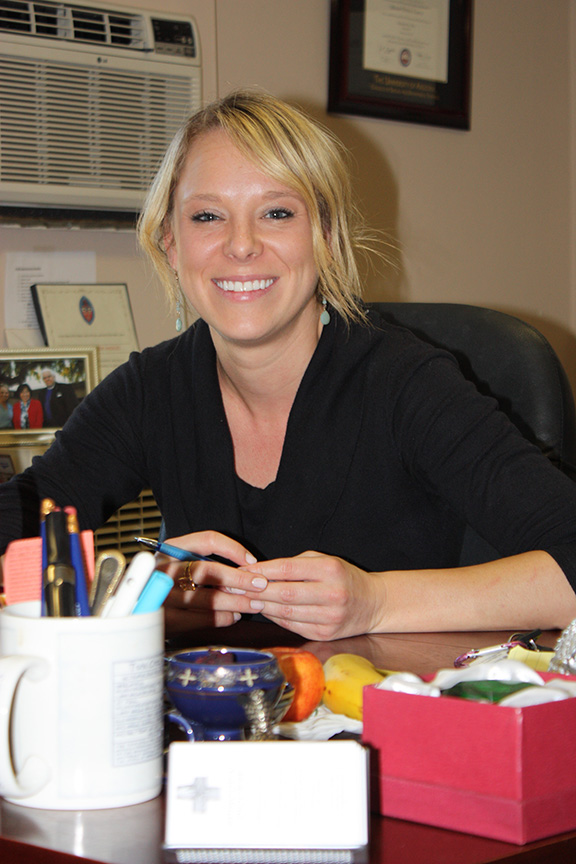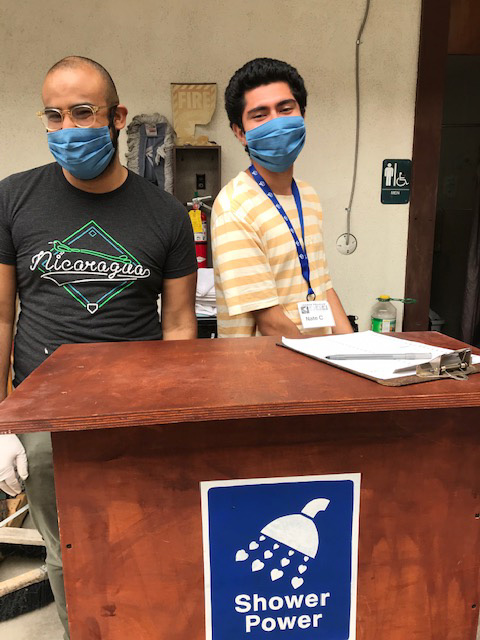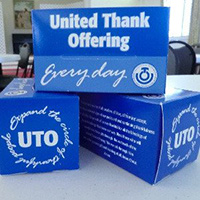
Clients line up at St. Luke’s Church, Long Beach, for a shower, clean clothes and food. Photo: Jane Gould
Two ministries within the Episcopal Diocese of Los Angeles — the Interfaith Refugee and Immigration Service (IRIS) and St. Luke’s Church in Long Beach — will get a boost this year from United Thank Offering’s 2020 Covid-19-themed grants program.

Meghan Taylor, executive director of IRIS, immigration and refugee ministry of the Diocese of Los Angeles, is pictured in her office at St. Francis Chapel in the Atwater Village area of Los Angeles. Photo: Janet Kawamoto
Meghan Taylor, IRIS executive director, said the agency, a ministry of the diocese and an affiliate of Episcopal Migration Ministries, received a $25,000 grant to launch a New Start Asylee Orientation Program in January 2021. The program will assist recently released detainees in gaining access to much-needed services and support.
“Asylees and asylum seekers are among the most vulnerable populations,” Taylor told the Episcopal News recently. “They are not eligible for stimulus payments and they are not work authorized.” As more people are being released from detention because of the Covid-19 pandemic, the need for such services is growing, she said.
Some detainees when released “have somewhere to go,” Taylor said. “Sometimes, they don’t. This grant will help us provide an orientation so once the asylum seeker’s case is approved, they’re immediately eligible for services and benefits. Then they have a path to get a green card and U.S. citizenship. They are eligible for cash, food, and medical assistance.”
Taylor said that the nonprofit agency applied for the grant after realizing that most asylees are unaware of the benefits available to them. IRIS’s goal is to provide those orientation services to 100 new asylees in 2021, she said.
Such assistance includes explaining the implications of their new status, their rights and immigration requirements, including a one-year deadline within which they must obtain a green card.
“Currently, asylees have a small window of time, 30 days after they are granted asylum, to take their approval asylum letter to social services offices to apply for benefits,” Taylor said. “If they find out about the benefits too late, they’re out of luck.”
The agency will also provide Covid-19 support baskets, filled with face masks, nonperishable food, personal hygiene items, disinfectant, gloves, sanitizer, household items, and a thermometer, “to give them what they need to be Covid-safe as soon as they are released from detention.”
Once asylees apply for those benefits, they are automatically enrolled in a refugee employment program that offers employment training, job search, childcare and other assistance to help them become self-sufficient.
“It’s an orientation program but it’s also more than just giving them the information,” Taylor said. It includes advocacy with social service agencies. “Sometimes their cases are wrongly denied. They come back to us. We have to follow up with the office and explain who they are and why they should be approved.
Asylees are “often individuals who don’t speak the language or are coming from a place where they distrust the government,” Taylor added. “Often, they don’t understand the system or the way social service agencies work. So, if they’re turned away, they might never go back. It might be too much for them to handle without understanding what’s being requested of them.”
Taylor said the agency’s primary focus, welcoming and resettling refugees “has come to a screeching halt until a presidential determination is signed.”
The Trump Administration has said it would cap refugee admissions to the U.S. at 15,000 in the fiscal year that began Oct. 1, down from 18,000 in 2020. Taylor said that actual 2020 admissions were reduced to about 10,000 because of the Covid-19 shutdowns.
Before Trump’s tenure, national yearly refugee admissions averaged about 90,000, she said.
“This is at a time when the world is approaching the highest number of displaced people we’ve ever seen,” she said. Many refugee resettlement agencies “have been holding on these four years by a shoestring waiting to see what happens.”
Although the agency has reduced staff from 25 to 10, IRIS has managed to survive by offering legal services through a contract with the California Department of Social Services and cross-training staff as credited representatives with the Department of Justice, meaning they can assist in legal representation of immigration clients.
“Probably about 75% of our workload right now is with the broader immigrant community and about 25% is with refugees and asylees,” Taylor said

Volunteers check in shower ministry clients at St. Luke’s, Long Beach. Photo: Jane Gould
Expanded laundry facilities for St. Luke’s, Long Beach
On any given weekend, St. Luke’s Church in downtown Long Beach typically offers food, showers and laundry room facilities to about 100 guests.
A recent $10,000 UTO grant will enable the congregation to expand that ministry by building commercial-grade laundry facilities, according to the Rev. Jane Gould, St. Luke’s rector.
A motivating factor in applying for the grant was the lack of capacity, she said. “In using conventional washers and dryers, we would never get through all the laundry on Saturdays, which meant we had baskets full of dirty, possible diseased baskets of laundry sitting around our courtyard.”
She added: “If you put in a commercial grade laundry, maybe then you just don’t use it on Saturday morning when you’re doing showers.”
The church has also received a $65,000 Ahmanson Foundation Award to help expand the women’s bathroom from one to two showers, she said.
Both grants will assist St. Luke’s in better serving the community. The Ahmanson grant, Gould said, “is going to totally redo that shower area and build out the space for the laundry, and the grant from the UTO will help with the outfitting of the laundry.” The upgrades are expected to begin in January 2021
St. Luke’s also offers a hot meal to shower and laundry guests through partnerships with other local Episcopal and Methodist churches.

United Thank Offerings are collected throughout the multi-nation Episcopal Church in the organization’s signature blue mite boxes.
UTO: A ministry of prayer and giving
The UTO is a ministry of The Episcopal Church encouraging the embrace and deepening of a personal daily spiritual discipline of gratitude. The UTO encourages people to notice the good things that happen each day, give thanks to God for those blessings and make an offering for each blessing using a UTO Blue Box. UTO is entrusted to receive the offerings, and to distribute 100% of what is collected to support innovative mission and ministry throughout The Episcopal Church and provinces of the Anglican Communion.
UTO Board President Sherri Dietrich said deciding which grant requests to fund is always difficult. “But during this extraordinary time of suffering in the global COVID-19 pandemic we had to prioritize mere survival over thriving,” she said in a press release announcing the grant awards.
A total of about $400,000 in grants was awarded throughout the Anglican Communion. In 2021 there will be a second round of grants, focused around the theme “Recovering with Love and Gratitude: An Episcopal Response to the COVID-19 Pandemic in Local Contexts.”
Since its official founding in 1889, the UTO has awarded 5,357 grants for a total of $140,625,355.77.
The deadline for submitting applications for the second round of grants is Feb. 26, 2021. For more information, visit the website or contact the Rev. Canon Heather Melton, staff officer for the United Thank Offering, hmelton@episcopalchurch.org or 212.922.5130.
